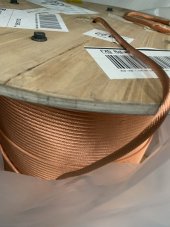 Hey gang -
Hey gang - I’ve got some LiFePo4 cells on order, and they’ll come with the usual set of bus bars and posts. But I’ll be building these packs to go into a van build, so beyond the usual concerns of the effects of expansion/contraction of cells on the bus bars and posts, there’s the added factor of vibration/rattling around.
I’ve been seeing where some folks have been using 4awg cables instead, crimping ring terminals on the ends, to handle both situations.
Lately I’ve been working part-time for a couple of friends who have a business making thermal transfer solutions for aerospace use, and much of what they make is made largely out of twisted copper cable. I chatted these guys up this morning about how well that material would work as a substitute for the usual bus bar, and they say it would be the equivalent of the 4awg cabling mentioned above.
I wanted to throw this out to the peanut gallery and get opinions, so have at it


